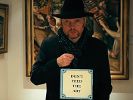Eye For Film >> Movies >> Art Will Save The World (2011) Film Review
Will art save the world? Maybe yes, probably not.
The title of Niall McCann’s documentary is a joke, elevating the work to a level of self-importance that the mischief therein consistently and amusingly undercuts. Fittingly, its central subject is singer-songwriter Luke Haines, of The Auteurs and other projects, whose lyrics include, “I’m the best artist / I don’t work hard / I don’t try hard / ‘Cause I’m the best artist”, and whose bespoke album Outsider Music was limited to just 50 copies that sold for £75 each. The gag being that Haines’ outsider status is due both to his own image-construction (semi-serious egoist with a redeeming sense of humour) and the cutthroat commercial nature of the British pop music scene. Both of these have all but consigned him to the margins of neglect, aided by a press industry eager to create buzzwords out of “Britpop” and write on it as a movement when it never was one.

As a biographical documentary, Art Will Save The Word has it both ways: McCann offers an effective overview of Haines through several interviews with the man himself as well as contemporaries and associates such as Jarvis Cocker, David Peace, John Niven, Charlie Inskip and Stewart Home (all of whom are admiring or celebratory), while at the same time confronting the limitations of linear biography by drawing our attention to both its own editorial construction and the elusive way in which Haines perpetuates/dispels the myths surrounding his career. Split-screens and freeze-frames evoke Godard, while the arbitrary minutiae that intermittently appear on-screen to jokingly establish historical context echo Haines’s own approach and response to historical linearity in his book, Bad Vibes: Britpop And My Part In Its Downfall. (Guy Montague’s editing is excellent.)
The film’s most obvious reference point, however, is Fat Man On A Beach, the 1974 Michael Bakewell-directed short starring B. S. Johnson, in which the author mused on his own life as well as anything else that he felt was worth discussing. Giving the camera a tour of the Walton-on-Thames he grew up in, Haines deals in non-sequiturs (pointing off-screen: “That house isn’t where I was born, the house where I was born is over there”) and sarcasm (referring to patronising notions of a working-class culture: “Fuck ‘the man on the street’”).
Johnson killed himself a fortnight after filming of Fat Man On a Beach completed; McCann’s film, which resembles Bakewell’s long before we discover that Haines did the soundtrack for Christie Malry’s Own Double-Entry (2000), the unreleased adaptation of Johnson’s novel, keeps returning to Brighton Beach for a running gag on Haines’s own botched jump from a high wall in Spain, in the convalescing aftermath of which he wrote the album After Murder Park. Accompanying lyrics: “Life is unfair / Kill yourself or get over it”.
Life is unfair, but art might save us.
Reviewed on: 01 May 2013

















